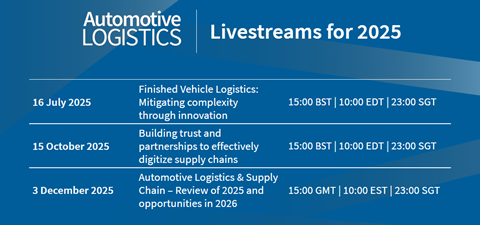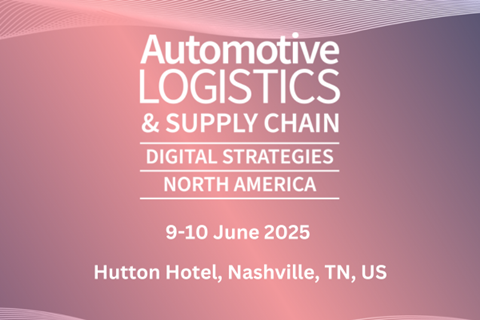How digital data strategies are helping automotive supply chains manage trade volatility, compliance risks and tariff disruptions
Digital strategies are becoming increasingly important in automotive supply chains to predict and protect against risks and improve resilience, and data lies at the foundation of these digital tools. In our latest livestream, supply chain experts weighed in on the importance of creating and maintaining data you can trust, educating teams on how to use, store and share data, and how to avoid data silos within organisations and the wider supply chain.

“The greatest challenge with managing tariffs is having the ability to quickly consume, interpret and anticipate the infinite number of possibilities the government presents on a daily basis.” – Skotti Fietsam, Accuride
Resilience has always been front of mind for the automotive supply chain, but in recent years it has become apparent that it might be the most important quality of a supply chain to mitigate against geopolitical disruptions and natural disasters. The recent tariffs threatened and imposed by the US government have thrown more uncertainty onto global supply chains, and many OEMs and suppliers have turned to data for answers on optimising trade flows and preventing financial risks.
Addressing the challenges and opportunities that come with these digital strategies, John Rich, manager of data analytics & AI programmes at Mazda North American Operations, Aleksej Kruekov, general manager of overseas service, EMEA at CATL, and Skotti Fietsam, senior vice-president of supply chain and CIO, Accuride spoke to Automotive Logistics in our ‘Data silos, security and sovereignty’ livestream.
Understanding data as a foundation
In the second instalment of our new livestream series, the experts discussed how to build supply chains that can flex without breaking in the face of uncertainty. Mazda’s Rich, who will be leading an interactive workshop about AI results on day one of our ALSC Digital Strategies North America conference in Nashville, said data is “liquid gold” in today’s market. He said businesses need to understand the value in their data, as well as understand how to collect and standardise it, to realise the benefits.
“A lot of data teams try to do everything themselves and wait until they’ve finished a product before they bring in the business,” Rich said. “If you do that ahead of time, it will be more effective. Businesses need to understand that they key critical component in successful AI use is data, it’s the fuel for AI. Once you have that foundational knowledge, then you can really start to move the needle in critical areas, which is very important in today’s landscape, because if you’re not moving at the speed of the industry, you’re going to be left behind.”
Compliance and data regulation
An area that can be difficult in the digital adoption and getting to grips with data is the ever-changing regulatory system and varying compliance standards around the world.
“We’ve seen so many new regulations, law and compliance issues that have risen to the top especially in the automotive sector and in the age of the connected vehicle, and it’s really important to be aware of that,” Rich said. “The US alone is very complicated right now, it seems like every single state is coming up with their own privacy laws. Then there is GDPR in the EU and the new EU AI act.
To combat this, Rich suggested the industry needs to aim for standardisation and interoperability in software systems. “It’s very important to make sure you build a system that uses encryption, anonymisation, fine-grained access controls, and push for standardisation, because that will be key when you’re working globally, and having that interoperability to be able to design your platforms for resilience, control and adaptability.”
Accuracy in keeping up with fast changing trade flows
Accuride’s Fietsam said data accuracy is particularly important in fast-paced changing geopolitical situations, such as the recent US tariffs.
“Tariffs are the hottest topic of the supply chain at the moment, and have been for the past few months. The greatest challenge with managing tariffs is having the ability to quickly consume, interpret and anticipate the infinite number of possibilities that the government presents on a daily basis,” she said.

“When everyone sees data as a zero-sum game, they are less likely to be open and transparent.” – Aleksej Kruekov, CATL
Speaking about ensuring customers’ pass through of the tariffs, she said: “That’s been difficult to manage as we are trying to match up the dates of the different tariffs with the shipping and border crossing dates. All of those pieces of data are going to be the way that we manage this.” Fietsam added that identifying and verifying countries of origin for different parts is going to be crucial, which again relies on accurate data.
Building trust in sharing data
When data is considered liquid gold, sharing it can be a big risk and requires a lot of trust between partners.
“We like to treat our business partners with the utmost transparency possible. Of course, this comes with non-disclosure agreements,” Fietsam said.
CATL’s Kruekov said that aside from lack of standardisation and data integration, trust is one of the biggest barriers to data shaing.
“When everyone sees data as a zero-sum game, they are less likely to be open and transparent, and do not have much motivation to collaborate,” he said. “Building a culture that emphasises the mutual benefits of data sharing is the backbone of digitalisation. You need to demonstrate that sharing data will benefit both parties to build long-term trust.”
Ensuring there’s a human-in-the-loop
While data that is accurate, well-managed and secure can be “liquid gold” for automotive logistics, there is still a need for human intelligence.
Rich said that while an AI-enabled sentient supply chain may be a reality in the future, there is still a need to have a human-in-the-loop approach, checking and verifying the data that the AI is using and the AI’s outputs.
Using the Turing test, which compares human versus machine output, most AI software programmes typically come close to a 50% score, but recently, a test on the beta version of Chat GPT 4.5 passed the test with 70% accuracy.
“It’s getting there, but I think it’s important to know we’re not there yet,” Rich said. “AI is currently best at doing tactical things that you can logically instruct it to do, not necessarily strategic things. It can’t really understand large amounts of information and make judgement-based decisions on your behalf. You really still need that human-in-the-loop for effective AI use.”






